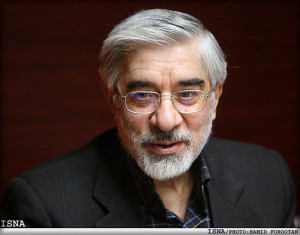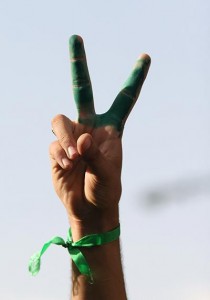The Latest from Iran (26 February): Closing the Door?
 Friday, February 26, 2010 at 19:12
Friday, February 26, 2010 at 19:12  2110 GMT: Khamenei v. Khomeini. Radio Zamaneh has more on the criticism of Ayatollah Khomeini's grandson, Seyed Hasan Khomeini, by the Supreme Leader's representative in the Revolutionary Guards, Ali Saidi.
2110 GMT: Khamenei v. Khomeini. Radio Zamaneh has more on the criticism of Ayatollah Khomeini's grandson, Seyed Hasan Khomeini, by the Supreme Leader's representative in the Revolutionary Guards, Ali Saidi.The conflict was sparked when the head of the Institute of Ayatollah Khomeini’s Publications, Mohammad Ali Ansari, wrote to Saidi to remind him of the Khomeini's insistence on no military intervention in politics, Ali Saidi then criticized Hassan Khomeini’s decision not to attend the August inauguration of Mahmoud Ahmadinejad. He alleged that the Ayatollah's grandson was standing against "the system and the Leader".
NEW Iran Document: Latest Karroubi Interview “The Shah Didn’t Behave Like This”
Iran: Mousavi, The Regime, & "The Prerequisites of Escalation"
Latest Iran Video: The Rigi “Confession” (25 February)
Iran Analysis: Khamenei’s Not-So-Big Push
Iran Follow-Up: Interpreting the Assembly of Experts “The Certainty of the Uncertain”
Iran Analysis: The Assembly of Experts Mystery
The Latest from Iran (25 February): Misleading Statements?
2100 GMT: Political Prisoner Watch. Mehrdad Bal Afkan, a senior member of the Mojahedin of Islamic Revolution party and Mir Hossein Mousavi's campaign, was arrested in Isfahan on Thursday.
2050 GMT: That "Path to Atonement" Thing (see 1915 GMT). Could the regime be setting up an offer of amnesty or reduced punishment for those who will give up their opposition? Alongside Ayatollah Jannati's Friday Prayer are the words of Iran's Attorney General Gholam-Hossein Mohseni-Ejeie: "If those who have been arrested in recent riots truly repent and compensate for the damages they have caused and correct their past conduct, they will be helped in the Appeals Court."
2005 GMT: Back to the Friday Prayer (see 1915 GMT). Ayatollah Jannati might have been a bit less hard-line than usual with the invocation that all the naughty protesters "to wake up and come to their senses", but I think he may have a message for a Mr Hashemi Rafsanjani: “If the elite are not in accordance with the movement of these rioters, why don’t they protest against them and advise them?”
1945 GMT: Larijani Watch. Blink and you might miss the story....
Agence France Presse headlines a ritual denunciation by Speaker of Parliament Ali Larijani, speaking in Tokyo, of the International Atomic Energy Association and the "West":
One of the defects in the IAEA is that it changes positions and attitudes if it is put under certain political pressure. I think the IAEA should be an organisation that states its views based on concrete facts, but should not comment on something such as 'there is a possibility.
Yawn. It's only in the 8th paragraph that AFP gets to the real story, with Larijani repeating his Thursday welcome to "third-party enrichment" by Japan: "I don't know if you read the Japanese offer, but various proposals are made in it. We welcome this kind of subsurface-level initiative."
1915 GMT: Your Friday Prayer Summary. Ayatollah Ahmad Jannati taking the podium in Tehran, and a bit of a surprise. After all the talk this week of the "sedition" of the opposition, the hard-line head of the Guardian Council appears to have been a bit of a softie, declaring, "the path to atonement is still open". Of course, those who atone need to recognise that, on 22 Bahman, the Iranian people "showed that [they] do not fear enemies, threats or sanctions, are committed to [their] stances and are loyal to and believe in 'velayat-e-faqih' (clerical authority)."
1910 GMT: An EA Special. We've posted the English translation of Mehdi Karroubi's latest interview, with his forthright defiance and the lament, "The Shah didn't behave like this."
1500 GMT: Nuclear Power Play. What a way to come back from an academic break. I find that Press TV is pushing the statement of the head of the Parliament's National Security Commission, Alaeddin Boroujerdi, declaring in Tokyo:
Japan's participation and involvement in the construction of Iran's power plants will serve the interests of Japanese state and private companies. Iran's suggests that Japan start its job from a particular point, by building a nuclear power plant inside the country.
How big? Boroujerdi is in Japan with Speaker of Parliament Ali Larijani, who announced yesterday that "third-party enrichment" is back on the table, with Japan enriching Iran's uranium stock. So the deal is laid out: the international community gets its oversight of Iran's nuclear fuel, Tehran gets a nuclear power programme with the assistance of Tokyo, and Larijani and his allies --- no doubt representing the wishes of the Supreme Leader --- also outflank President Ahmadinejad.
1130 GMT: Political Prisoner Watch (cont.). Activist websites reported that the women's ward in Section 209 of Evin Prison is overcrowded, with cells holding seven detainees rather than the recommeded two or three. Most in Section 209 are academics.
The news follows the revelation of imprisoned journalist Bahman Ahmadi-Amoui that 40 prisoners are being held in a 20- meter cell in Evin.
1105 GMT: Political Prisoner Watch. A series of reformist members of Parliament and parties have asked the head of Iran's judiciary, Sadegh Larijani. to release journalists and political activists for Iranian New Year, Nowruz. Pro-Ahmadinejad MPs replied that it is up to the judge to decide the status of detainees, and this has nothing to do with Nowruz.
1100 GMT: Larijani v. Ahmadinejad Watch. Even when he's in Japan, Speaker of Parliament Ali Larijani is slapping at the President: he has declared that 34 of 39 proposals presented by the Government do not conform to the law.
1055 GMT: Khamenei, Khomeini, and the Revolutionary Guard. The Supreme Leader's representative in the Islamic Revolution Guards Corps, Hojatoleslam Ali Saidi, has sharply answered the criticism of those who accuse the Revolutionary Guard of interference in political matters: when civilians attack the holy republic, how can the IRGC stand aside?
There were also pointed words for the grandson of Ayatollah Khomeini, Seyed Hassan Khomeini: how could he oppose the Supreme Leader and the Iranian system (nezam)?
1050 GMT: A slow political day, but that gives us the chance to feature a provocative analysis, from The Newest Deal, that the momentum for the Green Movement will come from the regime's rejection of Mir Hossein Mousavi's five proposals for justice and reform.
0810 GMT: The Committee for Human Rights Reporters posts that women’s rights activist Somayeh Rashidi has been released from Evin Prison after more than two months in detention.
0800 GMT: The big manoeuvres yesterday were within the regime, as key participants either tried to close the door on any challenge or to keep it slightly open for further manoeuvres. We've got two special analyses: Mr Verde takes a long look at this week's inconclusive, somewhat confusing Assembly of Experts meeting, featuring Hashemi Rafsanjani, and we assess the Supreme Leader's "not-so-big push" to secure his position.
Meanwhile, you could take your pick of sideshows. There was Iran's unsubtle propaganda push on captured Jundullah leader Abdolmalek Rigi with his confession (see separate entry) as proof of US sponsorship. Bashir al-Assad and Mahmoud Ahmadinejad struck their poses in Damascus, and US and Israeli officials met in Israel in a "strategic dialogue" which featured Iran's nuclear programme.
 Agence France Presse,
Agence France Presse,  Ali Larijani,
Ali Larijani,  Assembly of Experts,
Assembly of Experts,  Ayatollah Ahmad Jannati,
Ayatollah Ahmad Jannati,  Ayatollah Ali Khamenei,
Ayatollah Ali Khamenei,  Ayatollah Ruhollah Khomeini,
Ayatollah Ruhollah Khomeini,  Bahman Ahmadi Amoui,
Bahman Ahmadi Amoui,  Committee for Human Rights Reporters,
Committee for Human Rights Reporters,  Evin Prison,
Evin Prison,  Gholam-Hossein Mohseni-Ejeie,
Gholam-Hossein Mohseni-Ejeie,  Hashemi Rafsanjani,
Hashemi Rafsanjani,  Hojatoleslam Ali Saidi,
Hojatoleslam Ali Saidi,  Iran,
Iran,  Iran Elections 2009,
Iran Elections 2009,  Mehdi Karroubi,
Mehdi Karroubi,  Mehrdad Bal Afkan,
Mehrdad Bal Afkan,  Mir Hossein Mousavi,
Mir Hossein Mousavi,  Mohammad Ali Ansari,
Mohammad Ali Ansari,  Mojahedin of Islamic Revolution,
Mojahedin of Islamic Revolution,  Mr Verde,
Mr Verde,  Press TV,
Press TV,  Seyed Hassan Khomeini,
Seyed Hassan Khomeini,  Somayeh Rashidi,
Somayeh Rashidi,  The Newest Deal in
The Newest Deal in  Middle East & Iran
Middle East & Iran 


